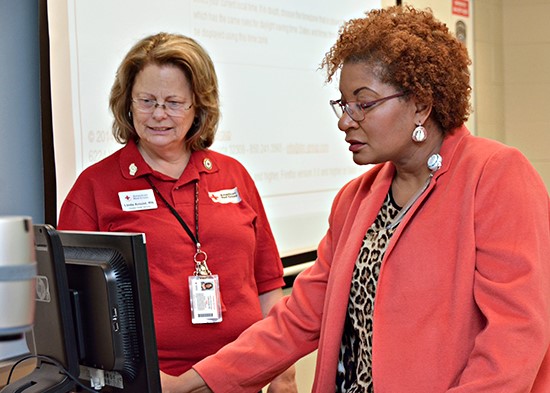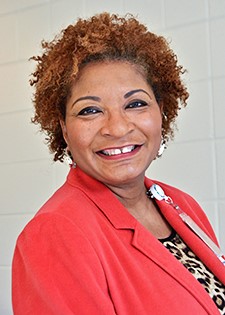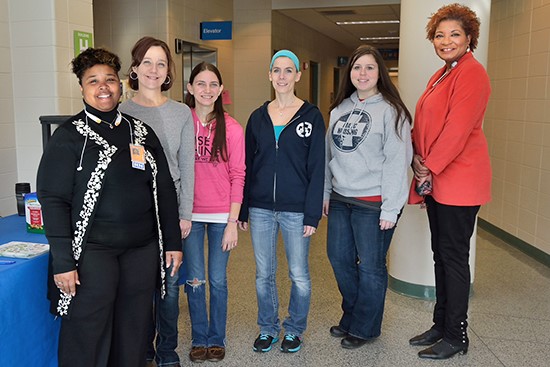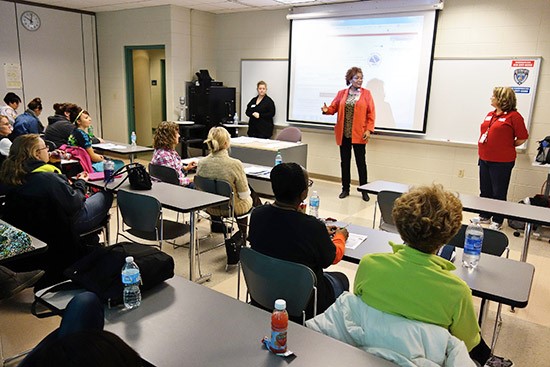
Linda Arnold of the American Red Cross (left) and Melanie Gray (right) taught a disaster preparedness training session for MATC School of Health Sciences students, faculty and staff.
In 1968, 11-year-old Melanie Gray and her father rushed to Cooley Auditorium to get a “good seat” for her mother’s graduation from MATC’s practical nursing program. It left quite an impression on her. “We were so proud of her and so excited,” said Gray, now an MATC nursing instructor.
She cherishes memories of watching her mother, Jeannie Lewis, and Loretta Sprewer, who Gray cites as one of her mentors, studying at the kitchen table night after night. Gray also has fond memories of helping her mother prepare for the next day’s work by scrubbing her nursing cap with a toothbrush, ironing her uniform and cleaning her shoes every night.
Gray’s father, Andrew Lewis, also studied at MATC, taking welding and refresher courses. Having inspiring role models like her parents and Sprewer made all the difference in her life, Gray said. “My parents’ dream for me was to go to school. I am where I am in life because of what my parents did for me. Their legacy is me.”
Gray said, “My parents lived through segregation and the Jim Crow era. Their hope was that I would benefit from the advantages afforded African-Americans by the civil rights movement.” While some aspects of life improved for African-Americans, many now live together in impoverished communities, she said.

Melanie Gray
Young African-Americans Have Few Professional Role Models
She explained that when she was younger, church was the cultural and political center of the African-American community. "We as children had professional role models and black professionals as neighbors and as fellow parishioners." Gray said that currently African-American youth do not have direct access to many role models to instruct them on life and career planning.
"The schools are crowded and the counselors are overwhelmed," she said. "Neighborhoods are more transient. Many students don’t know one African-American professional other than a teacher."
This societal shift concerns Gray. As a way of giving back to the community, she has become devoted to serving as a role model and encouraging young people to pursue a college education and do as much as they can with their lives.

Gray (right) poses with students from MATC's School of Health Sciences.
Devoted to Student Success
Gray is a faculty advisor to MATC’s chapters of the Student Nurses Association and Future Black Nurses Association. She serves on the college’s Student Success Core Committee and chairs MATC’s Completion Challenge Committee, an initiative tasked with identifying strategies and approaches to ensure that as many students as possible stay in school and earn their MATC degrees. She also represented the School of Health Sciences on the college’s Service Learning Committee.
As a student club advisor, she led members of the Student Nurses Association to the National Student Nurses Association convention in Nashville in April 2014, an experience that was new to them. "Taking students to the conference was one of my proudest moments," she said. "The experience really energized them.” Last fall, the group sponsored disaster training for students and faculty in partnership with the American Red Cross. The group has planned two campus blood drives for this spring and additional disaster preparedness training. They also will attend state and national Student Nurses Association conventions.
Activities such as conventions and campus and community outreach help students develop a sense of professionalism and reinforce ideas about growing and developing their careers. We've got to encourage all of our students to be active in their communities and do the best we can to inspire them. We've got to plant the seeds.
"Activities such as conventions and campus and community outreach help students develop a sense of professionalism and reinforce ideas about growing and developing their careers," Gray said. "We’ve got to encourage all of our students to be active in their communities and do the best we can to inspire them. We’ve got to plant the seeds." Gray began her own nursing studies at Cardinal Stritch University. She recalls, "When I was studying at Cardinal Stritch, there was not one instructor who looked like me. My class was comprised of four other African-Americans. We clung to each other for support."
She went on to earn a master’s degree in education from Western Governors University and currently is pursuing a doctoral degree in education with a specialization in online learning and curriculum from Northcentral University in Phoenix, Ariz.
Gray spent more than 20 years as a nursing supervisor at Aurora Sinai Medical Center and a staff nurse in surgical intensive care at St. Luke’s Medical Center. She began teaching at MATC on a part-time basis in 2006 and became a full-time instructor in 2009.

Gray (center) makes a presentation during disaster preparedness training in November at MATC's Downtown Milwaukee Campus.
Sees Teaching as a Way to Serve as a Role Model
She moved into teaching from clinical work because she saw it as a chance to serve as a role model. "I want to encourage young people, and provide them with opportunities they might not be aware of," she said.
Gray said, "A two-year college like MATC provides tremendous value. MATC can be a good place to get a foothold for those who are down on their luck or have no job. The nursing assistant program, for example, can provide employability and a job with benefits after seven weeks of instruction. In nine months to two years, studying to be a nursing assistant or a nurse can take people from poverty to a family-sustaining wage. After the first year of the associate degree nursing program, students can take the Licensed Practical Nursing board exam and work as LPNs while completing their associate degrees. This alone is life-changing."
She said that students who pass nursing certification exams in Wisconsin also are automatically licensed in 16 other states. "Wisconsin has some of the best nursing training in the country," Gray said. "The pass rate for MATC nursing students – both licensed practical nurses and registered nurses – is in the 98 to 100 percent range."
Gray is very grateful to teach at MATC and to be able to help young people in her community get ahead and be successful. "I've been able to help many people, and many people have helped me," she said.
For more information on the registered nursing associate degree, visit:
http://www.matc.edu/health_sciences/degrees/registered-nursing.cfm
For information on the practical nursing LPN-RN progression associate degree, see:
http://www.matc.edu/health_sciences/degrees/practical-nursing-lpn-rn-progression.cfm
For information on the nursing assistant technical diploma, visit:
http://www.matc.edu/health_sciences/diplomas/nursing-assistant.cfm

